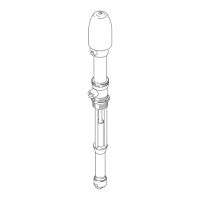307026 3
FIRE AND EXPLOSION HAZARD
Improper grounding, poor ventilation, open flames or sparks can cause a hazardous condition and
result in a fire or explosion and serious injury.
• Ground the equipment and the object being sprayed. Refer to Grounding the System on page 4.
• If there is any static sparking or you feel an electric shock while using this equipment, stop
spraying/dispensing immediately. Do not use the equipment until you identify and correct the
problem.
• Provide fresh air ventilation to avoid the buildup of flammable fumes from solvents or the fluid
being sprayed/dispensed.
• Keep the spray/dispense area free of debris, including solvent, rags, and gasoline.
• Electrically disconnect all equipment in the spray/dispense area.
• Extinguish all open flames or pilot lights in the spray/dispense area.
• Do not smoke in the spray/dispense area.
• Do not turn on or off any light switch in the spray/dispense area while operating or if fumes are
present.
• Do not operate a gasoline engine in the spray/dispense area.
TOXIC FLUID HAZARD
Hazardous fluid or toxic fumes can cause serious injury or death if splashed in the eyes or on the skin,
inhaled, or swallowed.
• Know the specific hazards of the fluid you are using.
• Store hazardous fluid in an approved container. Dispose of hazardous fluid according to all local,
state and national guidelines.
• Any additives to the air supply, such as oil or anti-freeze will be exhausted into the atmosphere.
• Always wear protective eyewear, gloves, clothing and respirator as recommended by the fluid
and solvent manufacturer.
MOVING PARTS HAZARD
Moving parts can pinch or amputate your fingers.
• Keep clear of all moving parts when starting or operating the pump.
• Before servicing the equipment, follow the Pressure Relief Procedure on page 7 to prevent the
equipment from starting unexpectedly.
WARNING

